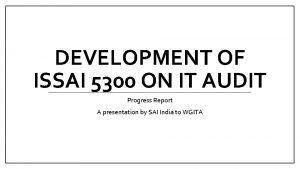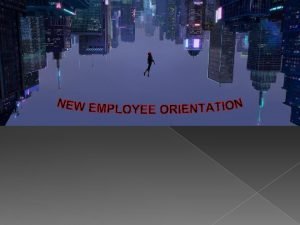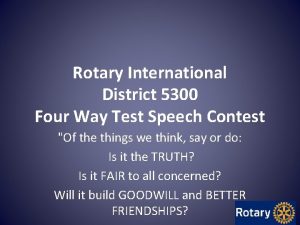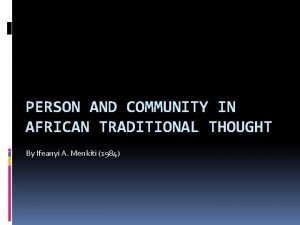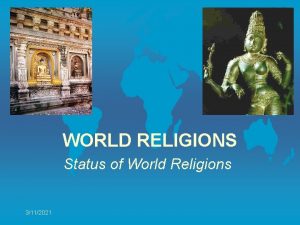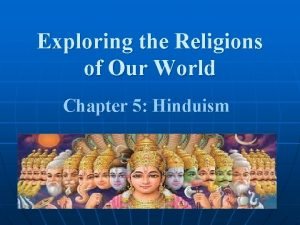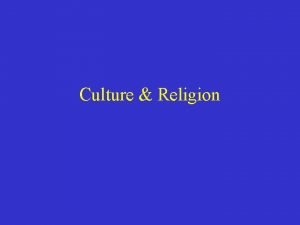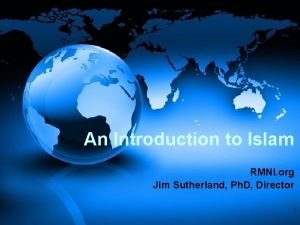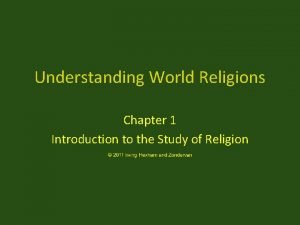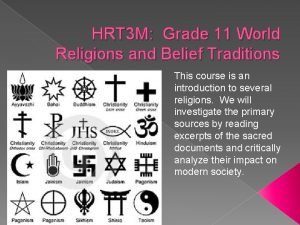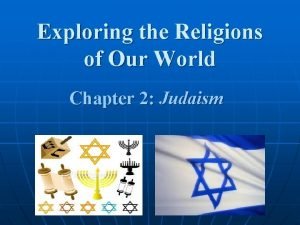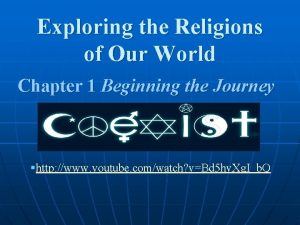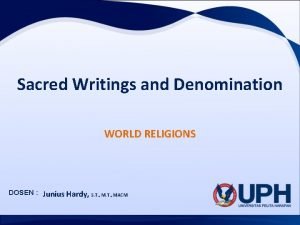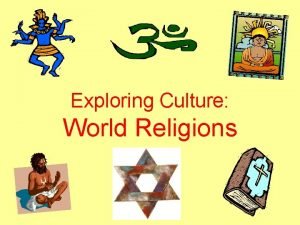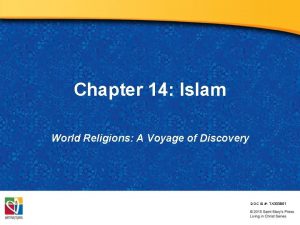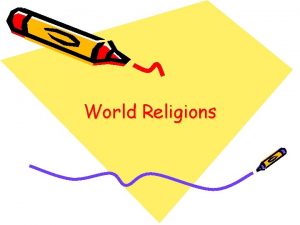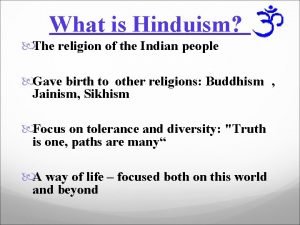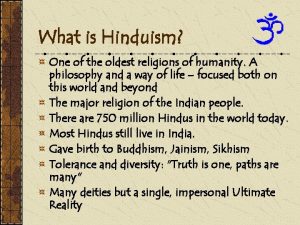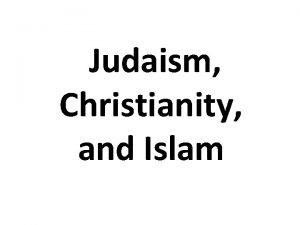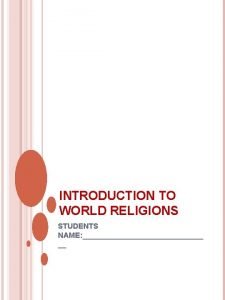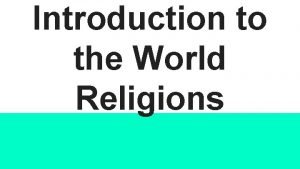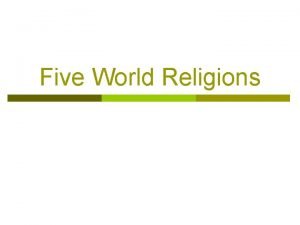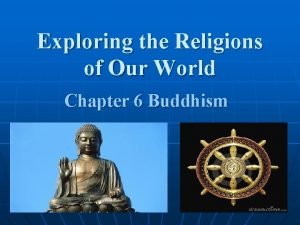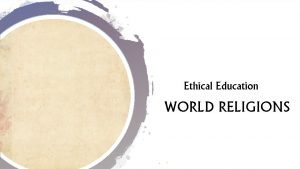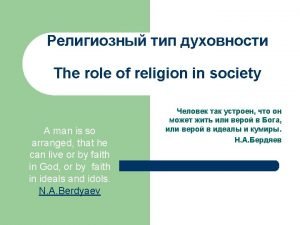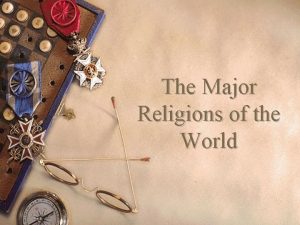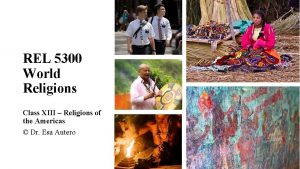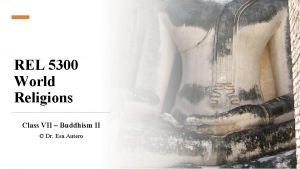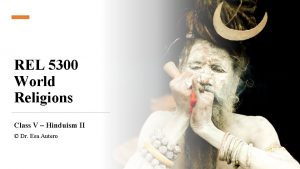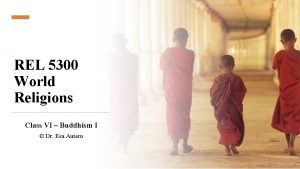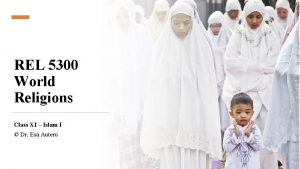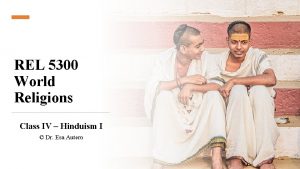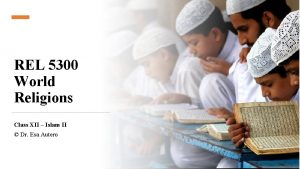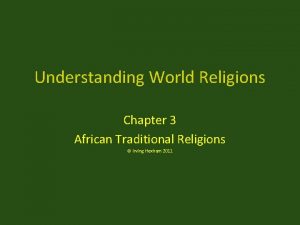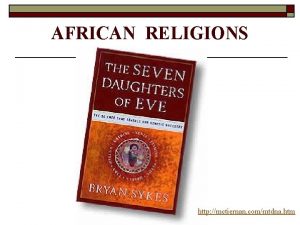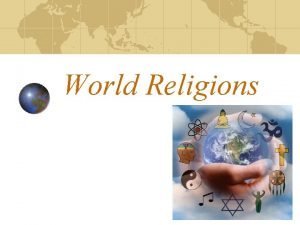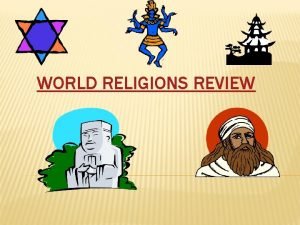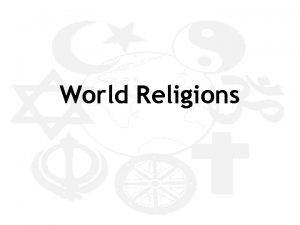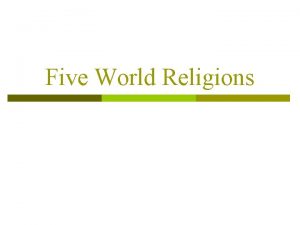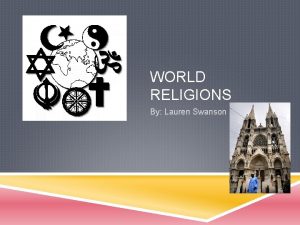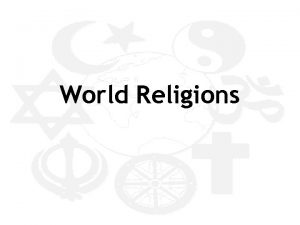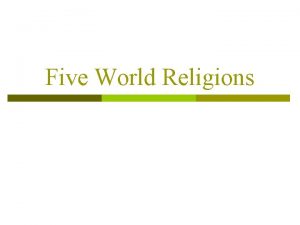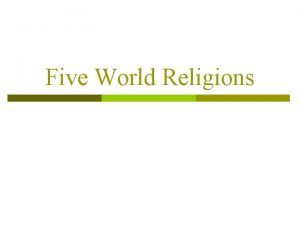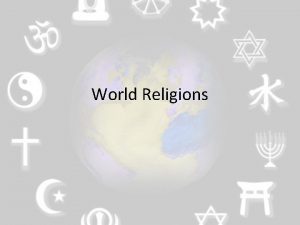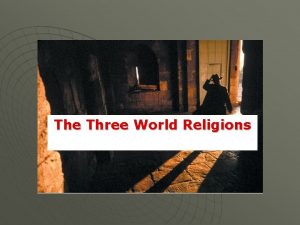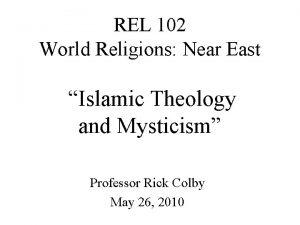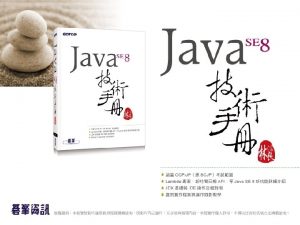REL 5300 World Religions Class III African Traditional




























- Slides: 28

REL 5300 World Religions Class III – African Traditional Religions © Dr. Esa Autero

African. Dei Traditional Religions Missio – Mission of God 1. 1 Introduction – African Traditional Religions (ATR) • What thoughts and images come to mind from the word Africa? • What comes to mind when you hear “African traditional religions”? • Any experiences w/ ATRs? Vast variety of deities, myths, deities, practices, contexts, cultures…

African. Dei Traditional Religions Missio – Mission of God • What thoughts and images come • Observations and/or real engagement? Yoruba (Nigeria; Benin; Togo…) Kikuyu & Maasai (Kenya & Tanzania) Lupupa (DRC) Zulu (South Africa)

African. Dei Traditional Religions Missio – Mission of God • African story -- • Observations and/or real engagement?

Estimated 12 milj. Black Africans sold into slavery b/w 1450 -1850 to the Americas; Muslim Arabs sold estimated 25 milj. Black African slaves b/w c. 700 -1900* Christian theologians condemned slavery already in the 13 th century (Aquinas and others) African. Dei Traditional Religions Missio – Mission of God 1. 2 Misunderstandings of African Traditional Religions (ATR) • Missionary caricatures of ATR Slave traders justified • Primitive and underdeveloped slavery – black Africans did not have a soul – many • Savage and/or demonic Christians opposed it* • Scholarly caricatures of ATR • Prejudice of Enlightenment philosophers against Africa* vs. “primal experiences”** • Lacked sophisticated philosophies and sacred books (ATR “primal religions”) common to all • Little interest in ATR – mainly anthropologists for the “exotic” religions • Evolutionary approach to religion – Africans lower in evolutionary scale Mana Animism Henotheism Monotheism ?

African. Dei Traditional Religions Missio – Mission of God • 2. 1 General Characteristics of ATR • Diversity – unity and diversity among ATR (= 15% of Africans adhere to ATRs) • Africa – 11. 5 milj. square miles/30 milj. Km 2 • Africa has <1000 languages; <1 billion people • Influence of Christianity (esp. 19 th century on) & Islam (7 th century on) No “pure” or “original” ATR exist w/o outside influence – always adapted • A definition of ATR • “African indigenous religions are localized, kinship-based, non-missionary religions with inarticulate, multi-stranded, and pragmatic beliefs aimed at securing optimal material health for the community, primarily through ritual activity. ” (Cox 2018, Kindle loc. 3521 -3526 in Patridge et al. )

Spiritual causes may seem arbitrary for the outsiders but make sense within the worldview of the adherent What happens to the community happens to the individual Human beings and Worldview: - West – I, [nuclear] family, nation - African – Family and community, I, tribe African. Dei Traditional Religions Missio – Mission of God “Since we are, therefore, I am” NOT “I think practicetherefore I am” • Seven general characteristics of ATRs* • i) Religion cannot be separated from social relations and cultural • Society consists of kinship groups & variety of spiritual forces, esp. the No word for “religion” ancestors primary allegiance to family & tribe Religion may seem “invisible” for outsiders • ii) Everything is religious – no division b/w sacred and secular realms • e. g. planting and harvesting or making a business deal guided by religion • iii) Successes and misfortunates in community explained per spiritual causes • Physical causes acknowledged – only give partial explanation to things • Problems due to disturbing spiritual equilibrium – gods/ancestors; human relationships or social norms; breaching taboos etc. Why did the crops fail? Why does Kwame’s business prosper? Why did the barn collapse on Ebony? Physical reasons variously emphasized but inadequate Diviners/shamans consulted to diagnose and solve problems

African. Dei Traditional Religions Missio – Mission of God • iv) Rituals – restore spiritual equilibrium and provide benefits/blessing • ATRs pragmatic and concern this life, not life after death • Rituals provide a means to communicate w/ spirits/ancestors and restore blessing • v) Reciprocity b/w community and spirits – acquire and maintain benefits • Bestowing gifts to the spirits – sacrifices to spirits, benefits for community • vi) ATR beliefs implicit/embedded, not explicitly • Non-missionary and no doctrinal debates per se • vii) ATRs are adaptive and accommodate new ideas/practices • Esp. contacts and mixing w/ Christianity (AIC) and Islam (and modernity)

Why is the Kikuyu the leading tribe of Kenya? They received the missionaries and God blessed them (Evangelical answer) OR other tribes done something foolish and “deserve” their lot (Olupona, p. 13)? Hierarchy of power: i) God; ii) gods; iii) spirits, ancestors (in order); iv) chiefs, sorcerers; v) people; vi) animals, plants, inanimate objects African. Dei Traditional Religions Missio – Mission of God • Power acquired from spirits and ancestors – one becomes General content of the ATRs a shaman through “calling”, and vows of • Dynamic reality – power located in ancestors/spirits, humans, apprenticeship, natural dedication phenomena, animals (and High God [when relevant]); focus on enhancing this- • • • worldly life-enhancing power of the community Primary focus = connection w/ spiritual powers to guarantee well-being of the community and society Well-being is communal not individualistic – individuals benefit as part of the community, family, and society Focus on the present – past and present dominate, (distant) future less relevant Focus on good health – good health = holistic human vitality, not absence of physical disease; health depends on good human relationships and harmony with the spirit world, esp. the ancestors Health and well-being expressed through ritual activity (festivals, dances, etc. )

Some ATRs have very few gods but many divinities/spirits African. Dei Traditional Religions Missio – Mission of God • African Traditional Three-tiered Worldview (simplified) • Sky/heaven (“Sky God” and gods) Boundaries fluid – interchange and connection b/w realms • Earth – Humans and animals (human realm – spirits and the realm of ancestors) • Earth/underworld (spirits/some humans/ancestors) Spirit-world is very densely populated • Animals revered for wisdom and power as sacrifices • Certain herbs sacred as potent medicine • Sacredness of mountains, rivers, forests, tree – places of spirits, gods, ancestors Agents from different realm interact with each other

African. Dei Traditional Religions Missio – Mission of God Myth = narrative sacred to a • 2. 2 Worldview, gods, ancestors, and sacred practices* group/people; explains an important truth (e. g. origin, identity) • 1) Cosmology and myths of origin • Religion permeates every area of life • Emphasis on deities, ancestors, divination, sacred myths • Myths and stories i) multiple versions; ii) reinterpreted in light of new circumstances (new generation; major events) • Creation myths sometimes overlap with myths about culture/social institutions Yatengas (BF) – Foulse descend from sky = rulers; Nioniosse from earth = priests • Examples of creation myths • Xhosa (S-Africa) – creation as emergence • Supreme Being enabled humans to come out of underworld through a hole/cave • Some stayed in the place of origin (Umhlanga [cave]) – very powerful

African. Dei Traditional Religions Missio – Mission of God • Fon (Benin) – Lesser deities as Supreme Being’s emissaries • Creator (Nana Buluku) births Mawu (or Mawu-Lisa [moon-sun]) who births 7 sets of twins, the deities of Voodoo pantheon – humans created by Mawu’s children placed b/w sky and underworld; and return to Supreme Being after death • Bambara (Mali) – creation emerge from void through a single sound Yo • Planets, stars, earth, people, animals form out of the emanating sound • San (southern Africa) – cosmos emerged from the creator’s body • Goddess Tumtumbolosa died – her stomach bloated until it exploded, and the universe poured out; forest grew out of a river; animals and humans came out of the exploding planets

Sometimes tribal conflicts deeper than Christian. Muslim disputes groups (e. g. Sudan) African. Dei Traditional Religions Missio – Mission of God • Sometimes myths of origin used to justify violence b/w tribes or • Tutsis (pastoralists) and Hutus (farmers) Rwanda genocide (1994) • Hutu myth: Tutsis tricked the land from Hutus and made them servants in exchange for cattle products; OR Tutsi monarch subdued a less formal Hutu leader – as a response Hutus welcomed Belgian colonial rule to receive equality Ways to justify “freedom fighting” and gang violence • Myths about death – as important as origins of cosmos • Xhosa (S-Africa) – chameleon and lizard • Supreme Being (Qamata) sent chameleon to earth to tell that humans don’t die; chameleon got tired on the journey. Lizard heard of chameleon’s task and ran off to tell that humans will die; humans believed the lizard and chameleon’s attempts to remedy the situation didn’t help.

Supreme Being (SB) in ATRs: i) SB most powerful, Creator, w/o origins ii) Often remote, not involved in human lives iii) Sometimes delegates creation to lesser deities iv) Sometimes SB equal to other deities v) Male or female or androgynous or no gender SB in ATR often associated w/ natural phenomena – but more powerful African. Dei Traditional Religions Missio – Mission of God • 2) Gods, ancestors, spirits • Gods, spirits, ancestors in ATR – personal and impersonal forces • Active agents in the human realm that influence all areas of life • Pantheon of deities – e. g. Orisha (Yoruba); Baalubale (Baganda) • Numerous deities in each pantheon (Orisha, 201/401 traditional numbers) • Families and individuals committed to reciprocal relationship w/ certain spirits and ancestors offer service, receive benefit • Character of divinities illustrated by myths and stories • Character of gods connected to cultural beliefs of people • Gods often share characteristics of human devotees – made in image of humans Relationship b/w gods and Supreme Being vary

Christian and Muslim ideas of God mixed variously w/ ATR concept of SB African. Dei Traditional Religions Missio – Mission of God Some ATR call SB Father and Creator but with varying nuances • Supreme Being (SB) often remote and not involved in human lives • Devotion and worship directed to lesser deities and ancestors • Yoruba (W-Africa) – Oldumare (SB) created all things but delegated creation on earth to Orisha under Obatala (eldest Orisha); Oldumare gave tools to Obatala to create land/life, yet fate of all things ultimately in Oldumare’s hands • Akan (Ghana) – Nana Nyame (SB) creator of all things, omniscient; Nyame used to live close to humans but women poked Him w/ sticks when they cooked yam and Nyame got aggravated and went away. • Lango (Uganda) – Jok (SB) is an intangible Force that inhabits natural world; it is benevolent creator and accessible through prayer and divination Jok has several manifestations (mother; illnesses; river force etc. )

To receive ancestor status (criteria): i) Peaceful passage to next stage (burial, ceremonies) ii) Died a “good death” not of illness, accident, viol. iii) Death at an advanced age (wisdom, experience) Who may become an ancestor? Men only? Women? All dead? African. Dei Traditional Religions Missio – Mission of God • Ancestors – deceased parents, forebears, and heroes • Difficult to distinguish b/w divinities and ancestors – vary among ATRs • Some distinguish “ancestors” [long gone] vs. “living dead” [recently deceased] Not all dead people become ancestors in an influential sense • Ancestors transcended human realm – bestow honor, blessing, calamities • Ancestral realm often akin to human realm – dependence for survival; ancestors live according to clans and families • Important in rites of passage (birth, puberty, marriage, death, burial) Ancestors help in crucial junctures – otherwise thwarted by evil spirits • Elders closest to ancestors b/c of age (Ba. Kongo of DRC) • Babies reincarnate ancestors – retain their memory for awhile (Beng of Iv. Cst. ) Beng ancestors live in European style metropolis – babies slowly forget this

If king’s sacrifices don’t bring rains (after drought), he is beaten into tears (Nyamwezi of TZ) African. Dei Traditional Religions Missio – Mission of God Daily activities of Ooni – juridical matters, • 3) Power and authority in ATRs official functions, and • Power and authority sacred and divinely sanctioned in ATRs ritual requirements • No dichotomy b/w sacred and secular power/authority as in secular west • Kings/leaders in ATR often endowed w/ life-sustaining powers connected to the well-being of the people and land taboos how leaders treated • Ooni of Ife, highest king of Yoruba, embodiment of Orisha on earth – cannot be addressed directly or seen by casual onlookers in daily activities King’s body • Asantehene (high king of Asante, Ghana) spoken to through triangle of high-extension of ranking attendants – if he sneezes, all in the court also sneeze, ritually earth indicating that Asantehene did not sneeze (one cannot acknowledge his illness) Good fortune, health, and blessing connected to the king/leader King uses rituals Crop failure, illness, • King (Nilotic of Sudan) associated w/ disasters – must be placated to restore drought blessing

Power related to one’s ability to control the spirit world for desirable ends = highly desirable – people become a) power brokers or b) consumers (devotees) African. Dei Traditional Religions Missio – Mission of God • Various religious leaders overlap in purpose, scope, and function • Kings/chiefs – societal and communal leaders – often w/ spiritual powers • Priest – often associated w/ established shrine/temple & official ritual activity • Shaman/Seer/diviner – communication w/ ancestors and spirits/gods; spirit/ancestor consulted and shaman acts as the “medium” in various ways • Medicine man/herbalist/sorcerer/healer – specialist in sacred herbs and healing remedies Mediators b/w human realm and realm of gods/spirits/ancestors Assumption – spirits/ancestors know the “why” of misfortunes and the “what” of the solutions • Diviners (shamans) and healers use spiritual powers for positive ends • Witches and sorcerers use spiritual powers for negative ends

African. Dei Traditional Religions Missio – Mission of God Locating the root of the problem – and solution to restore vitality and fortune • Types of divinations • Mediumistic divination – priest, diviner, traditional healer • Focus on communication w/ spirit world • Spirit possession, altered state of consciousness, dreams/visions • Consecrated objects; casting of objects* from a gourd (“cup”) – interpreted according landing, pointing, relationship, position, etc. of the objects • Church of the HS (DRC) – pastor in trance tells sick in high-pitched voice their illness and the remedy to get well • Often (if possible) clients consult diviners outside of immediate community to reduce the influence of rumors and bias – some disagree openly w/ diviner • Divination using devices and sacred texts • Ifa divination chain w/ nutshells (4+4)

African Traditional Religions • What should Christians think of other religions? • True/false (truth value); godly/

Divination rituals vary from very simple (gazing at water to tell future) to complex, elaborate rituals Ifa divination practices: In Africa: https: //youtu. be/k 9 l. GVF 6 j. YN 4 In diaspora: https: //youtu. be/l. Qb 3 CB 0 MUrs African. Dei Traditional Religions Missio – Mission of God • Two techniques of Ifa nutshell divination: i) diviner casts the chain (w/ nuts) on a mat to make a “U” shape – each half of the nut lands w/ one side up = combination interpreted acc. to “manual”; ii) palm nut passed from one hand to another – 1 -2 nuts fall out and marks made in the wood powder = int. results • 16 possible main odu (patterns) w/ 16 sub section = 256 possibilities – each odu connected w/ a myth, proverb, and remedy which is then recited; the recitations and proverbs must be interpreted to the client Client chooses most relevant ones – and diviner offers final interpretation Remedies range from sacrifices to tithe, ascetic practices, and conversion • Other similar divination patterns and rituals – some use sacred texts – Bible or Qur’an to facilitate divination (bibliomancy) • Nyole (E-Africa) – diviner selects Arabic text randomly and translates it; how does the passage apply to client’s problem

African witchcraft and sorcery not the same as neo -pagan (Wicca) focus on goddesses and nature veneration African. Dei Traditional Religions Missio – Mission of God • Witchcraft and sorcery – manipulation of occultic forces for selfish gain • Witches usually marginal people who self-isolate and are unfriendly • Believed to cause evil (bad luck, illness, crop failure, poverty, death…) • Witchcraft also associated w/ exceptional fortunes (compared to others) • Witches – turn into birds and to steal people’s blood, children, infuse poison, • • decrease fertility, kill by eating people’s shadows, and do other harm Sorcerers – manipulate traditional technology (herbs and medicine) Diviners (shamans) and healers use spiritual powers for positive ends Witches and sorcerers use spiritual powers for negative ends Witchcraft/sorcery – profound effects on personal, communal, social life • Women manipulate fear of witchcraft to intimidate husbands – who hold power over socio-economic resources

African. Dei Traditional Religions Missio – Mission of God • Fear of witchcraft led to witch-hunters & casting out of people from community and families • Women and children (also among Christians) • Witchcraft used by politicians for power-grabbing and wealth • Witchcraft used to explain accidents, illnesses, political oppression • Some marginalized youth use occult powers to escape poverty • Witchcraft rampant in University campuses – educated youth w/o work and/or opportunities & used by criminal organizations and gangs … the world is essentially spiritual and the material and the spiritual are totally integrated. Man needs power from outside himself to control his environment. Life’s purpose is to seek and maintain the balance and harmony that result in success, happiness and security. To do this man must deal with the spirit powers correctly. Thus by rites, rituals and liturgies, he must impress and manipulate spirit beings to produce success, happiness and security” (Steyne, 1990: 39)*.

African. Dei Traditional Religions Missio – Mission of God • What thoughts and images come • Observations and/or real engagement?

African. Dei Traditional Religions Missio – Mission of God • What thoughts and images come • Observations and/or real engagement?

Witchcraft and divination “approaching epidemic portions in Africa … widespread even among Christians” (Kunhiyop 2006, 374 [ABC]) African. Dei Traditional Religions Missio – Mission of God • 3. 1 Christian response to ATR worldview and practices? African cultures*: • The most important aspects of African culture: “People, people” i) Polychronic ii) Collectivist • Community (family, tribe etc. ), relationships the focal point iii) High context • Stories, myths, spirits, ancestors – and religious pragmatism commnunic. • Religion pervasive of all areas of life – at times hard to notice in everyday life • Things to consider • Many ATRs know Christian terminology but not the meaning • Fear of spirits and ancestors real and immediate – difficult to remove amulets, stop visiting traditional diviners even when real interest in the gospel present • The gospel power needs demonstration in tangible ways – also through life and experiences • ATR adherents not speculative and abstract – practical daily life the focus

Hierarchical spirit world controls human world – humans try to manipulate the spirit world for desired ends Building bridges b/w ATR and the Gospel: i) ATR sacrifices OT sacrifices NT sacrifices ii) Ancestors and intermediaries in ATR Jesus as the “only Mediator” who fulfills all mediators iii) The power of Jesus over “principalities and powers” African. Dei Traditional Religions Missio – Mission of God • How to share the gospel and contextualize it to ATR adherents? Need for deep theological, • Gospel & contextual theology must address*: cultural, pastoral • Powers, spirits, ancestors that pervade all areas of people’s lives engagement • What are theological and spiritual components of the spirit world – and to what extent they are influenced by spirit world and/or cultural traditions Rituals; rites of passage; ceremonies; festivals; traditional education and wisdom – communal feelings and images related to people’s identity “it’s demonic” • Why should ATR adherent not go to traditional healer? – received healing, not sufficient emotional support, wisdom, connection to ancestors • How does ATR understand: “power of the blood”; “power of the name of Jesus”; “power of the Holy Spirit”; “power of prayer” -- • spirits world not harmonious – humans try to control to receive blessing

Theological engagement w/ ATRs*: i) Harmony (holistic) – reconciliation of all things ii) Spiritualism – spiritual “why” of disasters iii) Power – what, where, how, why? iv) Communalism – ecclesiology (family, clan, tribe, spirit world) 5 For there is one God; there is also one mediator between God and humankind, Christ Jesus, himself human, 6 who gave himself a ransom for all —this was attested at the right time. (1 Tim 2: 5) African. Dei Traditional Religions Missio – Mission of God • Important to contextualize the Gospel in appropriate ways: • i) Adaptation (African cultural practices adapted acc. to biblical standards); Still leaves • ii) Exchange (exchange rituals/festivals per biblical standards); the question • iii) fulfillment (view Jesus as the fulfillment ancient African practices, e. g. of forms and Jesus as “The Great Ancestor”) specifics All rituals, sacrifices, spirits, ancestors, intermediaries find fulfillment in the person of Jesus Christ and His sacrifice and resurrection (cf. Hebrews) • Careful discernment regarding contextualization of the Gospel • Evaluate which practices are cultural – and which involve direct connection to evil spiritual powers incompatible w/ the Bible • Ancestor worship and/OR respect toward departed parents/ancestors • What to do with polygamous marriages after conversion • Rites of passage, spirituality, wisdom that is African yet biblical
 Issai 5300
Issai 5300 Ipd training
Ipd training District 5300
District 5300 Person and community in african thought
Person and community in african thought World religion map 2021
World religion map 2021 Exploring religions chapter 5 large
Exploring religions chapter 5 large Distribution of religions in the world
Distribution of religions in the world Major branches
Major branches World religions chapter 1
World religions chapter 1 Grade 11 world religions
Grade 11 world religions Exploring the religions of our world chapter 2 pdf
Exploring the religions of our world chapter 2 pdf Exploring the religions of our world chapter 1 pdf
Exploring the religions of our world chapter 1 pdf 5 major world religions and their founders
5 major world religions and their founders Junius hardy
Junius hardy Polytheistic religions
Polytheistic religions Religions of the world
Religions of the world Religions of the world
Religions of the world Who is a hindu
Who is a hindu World oldest religion
World oldest religion Religions of the world
Religions of the world Hearth of hinduism
Hearth of hinduism Religions of the world
Religions of the world Religion
Religion Religions of the world map
Religions of the world map Hinduism
Hinduism Exploring religions chapter 6 large
Exploring religions chapter 6 large Religions of the world
Religions of the world Religions of the world
Religions of the world Religions of the world
Religions of the world
